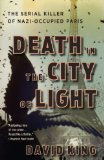Summary | Excerpt | Reviews | Beyond the Book | Readalikes | Genres & Themes | Author Bio

Critics' Opinion:
Readers' Opinion:
First Published:
Sep 2011, 432 pages
Paperback:
Jun 2012, 432 pages
 Book Reviewed by:
Book Reviewed by:
Jo Perry
Buy This Book
On the line was Secretary Canitrot at the Brigade Criminelle. Without
relaying the details of the discovery at rue Le Sueur, Canitrot urged
the boss to come as quickly as possible and sent over a car right away.
Fifteen minutes later, a long black Citroën 11 CV was waiting outside
Massu's residence, the chauffeur with a hand at his cap.
Bernard wanted to tag along, as he sometimes did on the most serious
or interesting cases. The commissaire agreed. Massu, a stocky man
in his fifty-fifth year, with a shock of black hair and a dark mustache, put
on his black overcoat and gray fedora. The two Massus, each wrapped
up for the night chill, hopped into the car and drove across the city that,
years before, would have been swirling with activity. That evening,
however, Paris looked, as Massu put it, "somber and deserted."
The city was suffering the fourth year of the Nazi Occupation. Huge
red and white banners emblazoned with a black swastika had flown
atop the Eiffel Tower, the Arc de Triomphe, and many other landmarks
and buildings near Petiot's town house. White placards with Gothic script directed traffic, mostly German and many of them, in that area, Mercedes-Benzes or Citroëns with small swastika flags on the fenders. The few people on the streets after the official ten p.m. curfew were Germans, "friends of the occupiers," and the "workers of the night." A brothel exclusively for Nazi officers was located just around the corner from Petiot's property.
As the car pulled up to 21 rue Le Sueur, a single streetlamp, hooded
for the wartime blackout, cast a dim bluish light on the activities of the
police, which, as Massu already realized, were inspiring an "uneasy curiosity"
among the street's residents. Some officers controlled the crowd
eager to watch from balcony windows; others followed the commissaire
inside the town house. Policemen were now arriving every few minutes.
Massu entered the mansion, which had a grand salon, a petit salon,
a large formal dining room, a billiards room, a library, six bedrooms,
and two kitchens. The house had previously belonged to Princess Marie
Colloredo-Mansfeld, a sixty-seven-year-old Frenchwoman whose husband's family had borne the title of imperial prince since 1763. The French actress Cécile Sorel, the comtesse de Ségur and doyenne of the Comédie Française, had lived there in the 1930s, a neighboring concierge was telling people. This would be claimed for years, but it is not accurate. Sorel had only rented the house to store her extensive wardrobe and trunks of memorabilia from her long career on the stage.
The current owner of the property was far less known to the general
public than either the princess or the actress. "The name Marcel Petiot meant absolutely nothing to me," Commissaire Massu admitted. It was the first time he had even heard it.
From what Massu could tell, the owner was an assiduous collector of
fine art. Many of the rooms boasted a splendid array of crystal chandeliers, oriental rugs, antique furniture, marble statues, Sèvres vases, and oil paintings in gilded frames. At the same time, there was a startling state of neglect. The rooms were not only dusty and full of cobwebs, but also, in some cases, the furniture was turned over or stacked in corners as if at a flea market. In several rooms and corridors were torn wallpaper, loose baseboards, and dangling panels. Massu saw exquisite Louis XV furniture alongside filthy couches with visibly protruding springs. When one officer warned that the case would most likely turn out to be appalling, Massu was unfazed. He had heard this before. In fact, almost every time a new crime was discovered, someone usually noted that it would be a "terrible histoire." He had no doubt that this might well be the case. As chief of the Brigade Criminelle, he was used to investigating disturbing affairs.
Still Massu was taken aback at the macabre spectacle in the basement
of 21 rue Le Sueur: the half-burned skull in the furnace, the pile
of tibias, femurs, and other bones on the floor. A foot, Massu saw, was
"blackened like a log that had been slowly consumed." A dismembered
hand, curled up tightly, "grasped the thin air in desperation." A woman's
torso lay there, with the flesh "gnawed away to reveal the splinters
of the ribcage." The stench - "the sinister odor of roasted human flesh,"
as he put it - gripped his throat.
Excerpted from Death in the City of Light by David King. Copyright © 2011 by David King. Excerpted by permission of Crown. All rights reserved. No part of this excerpt may be reproduced or reprinted without permission in writing from the publisher.




We must believe in luck. For how else can we explain the success of those we don't like?
Click Here to find out who said this, as well as discovering other famous literary quotes!
Your guide toexceptional books
BookBrowse seeks out and recommends the best in contemporary fiction and nonfiction—books that not only engage and entertain but also deepen our understanding of ourselves and the world around us.